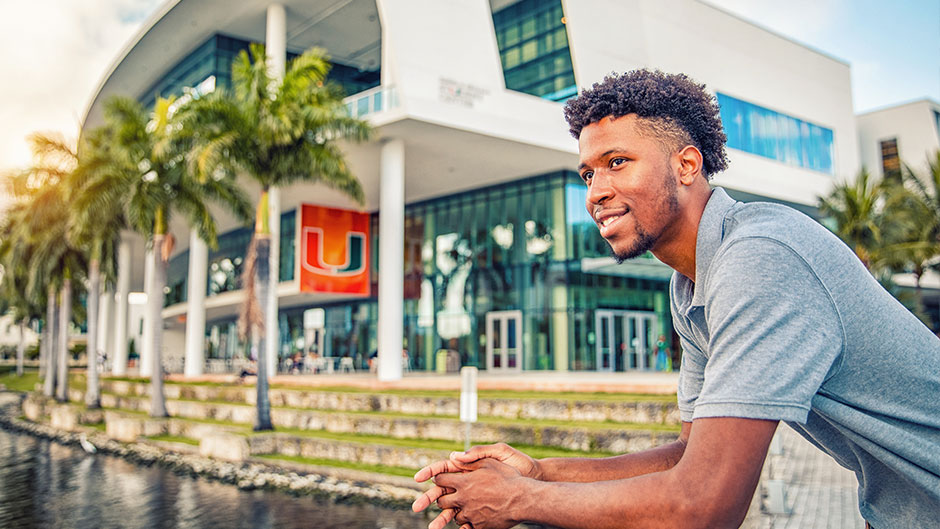Before arriving in Hong Kong last fall, junior Tre’ Vaughn Howard did not know much about the protests ensnaring the attention of the city’s more than 7 million residents.
But as he moved into his dorm room and started attending classes at the Chinese University of Hong Kong (CUHK) for a semester abroad, his roommate—a Hong Kong native—began telling him where the daily demonstrations were unfolding, sometimes even heading out to participate in them. His new classmates explained the reasons behind the nightly protests that engulfed areas of the city, and Howard received emails from CUHK and the U.S. Embassy about expected rally locations.
“Protests in America don’t typically last very long, so it wasn’t something I thought I needed to reconsider when choosing a place to study abroad,” said Howard, a broadcast journalism and political science major who is also a Hammond Scholar, a member of the President’s 100, and a reporter for UMTV.
Yet, as the demonstrations escalated, Howard decided to document the historic moment in his temporary home. He interviewed demonstrators on camera, took video of vandalism he witnessed, and posted short broadcasts on his Instagram stories.
“I didn’t go there to be a journalist; I went to be a student. But, I realized that I could not pass up the chance to tell this story,” he said. “People here are not aware of what’s happening in the world, so I thought, let me update [my friends] so they have an idea of what’s going on.”
While Howard was in Hong Kong, he interviewed students and residents who both supported and opposed the protests. He observed young demonstrators using sidewalk bricks to build blockades from the rubber bullets, water cannons, and tear gas used by police. In his last video, Howard shows viewers the messy aftermath of a nightlong rally between protesters and police at CUHK.
“The more I get into journalism, the more I understand how powerful it is, but also how vulnerable I am as a person reporting on a story,” he added.
For much of the semester, the clashes remained off college campuses. However, midway through November, the protests spilled onto the CUHK’s campus, where Howard and another UM student were living. For their safety, the University of Miami Study Abroad Office quickly arranged flights for the two students to return home, said Devika Milner, assistant dean and director of the office. CUHK decided to end the semester a week early and Howard returned to the U.S., where he completed his finals online.
“We partner with [CUHK] intentionally because we can count on them in emergency situations to ensure the health and safety of our students,” Milner said, adding that CUHK has been one of UM's longest-standing partner schools in Asia.
The protests throughout the densely populated city of Hong Kong started in June 2019, when the government proposed a bill to allow suspected criminals to be extradited from Hong Kong to other countries, including Taiwan or mainland China. However, protesters were concerned that if it was passed, the bill could be used to detain political dissidents and would increase China’s grip on the city.
“People look at it as another way that mainland China is violating Hong Kong’s ability to be sovereign,” Howard said. “But it’s a very complex situation without a simple answer.”
Although it is connected by land to communist-led China, Hong Kong is a former British colony that was returned to China in 1997. To preserve its democratic independence, Hong Kong was labeled a “special administrative area” of the Republic of China until 2047, when it is supposed to become part of the mainland. Its title means that Hong Kong operates under a “one country, two systems” philosophy, where residents enjoy many freedoms that the Chinese do not, such as a free internet, an independent court system, and an uncensored press.
Therefore, protests originally against the extradition bill—which is now withdrawn—have turned into rallies against China’s attempt to control Hong Kong.
The protests subsided in December, after election results led to some pro-democracy leaders taking power. Nevertheless, young demonstrators took to the streets again recently on New Year’s Day. The University’s Study Abroad Office has canceled the spring program in Hong Kong because of the uncertainty, Milner said.
Despite losing a week of his semester in Hong Kong, Howard is extremely glad he was able to study in the city. While many students opt to study in European countries with cultural norms similar to the United States, as a person who grew up in the small city of Fort Myers, Florida, Howard wanted an experience where he would be out of his comfort zone. In addition to understanding the protests, Howard learned about the high cost of living in Hong Kong and how large families were forced to share tiny apartments. He also got to discuss foreign affairs with students from across the world who were also studying at CUHK.
“I wanted something that would challenge me at all levels. And being in such a different environment, like Asia, really allowed me to grow,” he said. “It also allowed me to have more of a global perspective.”
Now, Howard wants to travel more, perhaps as a foreign correspondent. He spent weekends in Hong Kong traveling to South Korea, Thailand, and Japan. And after wrapping up his finals, Howard spent part of his winter break in Israel on a Hillel trip for non-Jewish students.
“Being in Hong Kong taught me that I can go anywhere and everywhere that this passport can take me,” he said. “I realized that I love to learn and do new things—both personally and professionally—and that’s something I never want to stop doing.”
For more information about study abroad programs, visit the University’s study abroad website or attend an information session.

